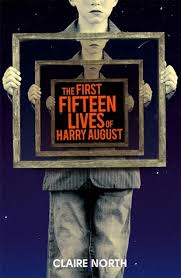A Really Big Century

So, I should say some more stuff about Harry August.
Summaries abound for the book, and increasingly there seem to be a lot of reviews (many lovely, which is awesome for my ego!) so instead I figure I’ll zoom in on something completely different-yet-connected. I mean, that’s author’s privilege, right…?
The First Fifteen Lives of Harry August tells the story of a man who lives his life over and over again. He’s born on January 1st 1919, and dies anywhere between 1980-2003 depending on how long his immune system can hold out, or if he doesn’t meet death by misadventure first. When he is born again in 1919, he fairly quickly finds himself remembering the entire life he’s lived before – essentially, remembering the future.
When deciding when Harry should be born, and when he should die, was one of the most important choices in the book. I wavered a bit, toying with having him born as late as the 1950s – but a great disadvantage of that was he could easily live to see my future, and I wasn’t sure that was the kind of book I was writing. Eventually I settled on 1919 for the very simple reason that someone born then who lives to be, say, 80 years old, has the possibility to see some of the most incredible changes to ever rock human society.
It’s not simply the Big Headlines – the Great Depression, World War Two, the Cold War, Cuban Missile Crisis, Fall of the Berlin Wall – but it’s a huge shift in cultures in every country of the world. Between 1919 and 1999, China will go from being an imperial country beset by warlords, to being a communist superpower, to being a country defined by the motto ‘to get rich is glorious’. It’s so easy to forget that one pair of eyes could see all that, and to forget how much all of that encapsulates. South Africa will go from being a colonial territory to an independent one dominated by an apartheid government, to a state where Nelson Mandela is finally freed and elected President. Electricity spreads across the globe, as rather less fortunately does the car. Charlie Chaplin is overshadowed by Michael Caine; Brahms by Elvis Presley. Computing develops, medicine takes incredible leaps forward, man walks on the moon! If ever you needed an image for an idea that simply couldn’t have been imaginable in 1919, then the image of Apollo 11 landing on the lunar surface just about encapsulates it. Civil rights movements begin to rise – and some to totter – voices rising for freedom of religion, of race, of gender.
Even in my short lifetime, I feel I have lived through momentous changes for humanity. I was born in 1986, when communism still dominated Eastern Europe. The first mobile phone we ever bought was the size of a small brick. Our first home computer was an Amstrad, and when we upgraded to something with 254MB of hard drive it felt like technology was running wild. I remember the day the Twin Towers fell, and the day Obama was inaugurated, but through all of this what I mostly remember was trying to get decent GCSE results, the steady rise in bus fares in London, my friends and moving flats. Memories of my youth seem banal, because they were simply my childhood, yet even looking back how different the 1980s and 1990s seem from today.
One of the great joys, therefore, of a character like Harry August is that he has a luxury we do not – he can look on the world of the 1920s with the eyes of someone who has lived in the society of the 1980s. During the 20s, the repression of women, religions and races wasn’t merely common, it was something barely considered. Imagine returning to that time having lived through the 1960s, the hippy movement, the collapse of the British Empire, the invention of the nuclear bomb! How might the social prejudices of the time seem then? How petty and blind are all the concerns of your contemporaries, as they blindly stumble closer and closer to economic disaster and world war? If you have seen the Cold War begin and the Berlin Wall fall, how ridiculous must the ideological battles of the twentieth century become, and how hard it must be deciding, when you hear people declare with absolute sincerity that communism is evil, women are weak and the peoples of America should be ‘equal but separate’ whether you are going to laugh or weep?





